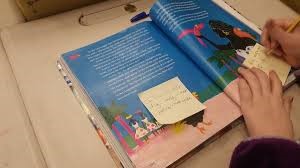Comprehende? Helping kids “get it”: 6 Reading Strategies for Parents and Teachers

Helping boys with comprehension is paramount. But with so many strategies and theories, no wonder parents (& sometimes teachers!) are overwhelmed. Do any of these sound familiar?
“James often plows right through reading, decoding words but not comprehending.”
“I can tell that Samuel doesn’t get the meaning as he works through a page of text.”
“Alex just gives up.”
As a teacher and tutor with 20+ years’ experience, I think that comprehension is probably one of the hardest areas for children to grasp and one that often needs parent involvement to support what is taught at school. You might like to try some of these strategies to enhance a boy’s understanding of texts:
1) Before Reading
Discover what your son/student already knows by tapping into his prior knowledge. Often boys know more than we give credit them for – draw out those ideas that are swirling around in his head. A boy will comprehend better if he can make a connection between the text, his life and the world at large.
2) During Reading
Start off by asking, “Does this make sense?” If the answer is no, use the most basic fix-up techniques of rereading, reading ahead, skipping or filling in a word.
One could argue, however, that if a child didn’t ‘get it’ the first time, then re-reading the text won’t help.
So try this tip: When your son reads, encourage him to have an inner conversation with the text. Does he respond with excitement, humour, wonder, even anger? If your son questions the text, disagrees with the author or nods his head in agreement then he’s better able to connect ideas, make inferences and better understand what he’s reading.
Encourage your son to form a mental image from the clues in the text/book.
We want our boys to recognise how important their thinking is when they read – even from an early age.
To add fun, use sticky notes to jot down ideas, questions, points, pictures – I find that boys of all  ages enjoy doing this.
ages enjoy doing this.
The famed children’s author Madeleine L’Engle says, “Readers usually grossly underestimate their own importance. If a reader cannot create a book along with the writer, the book will never come to life. . . . The author and the reader ‘know’ each other. They meet in the bridge of words.”
3) Making Predictions
Everyone predicts—including children—all the time. Our lives would be impossible, we would be reluctant even to leave our house in the morning, if we had no expectation about what the day might bring. Prediction though is not reckless guessing.
Why do we need to predict? In fluent reading aloud, the eye is always ahead of the voice, checking for possible hurdles to a particular understanding. Readers concerned with the word directly in front of their noses will have trouble predicting, and they will have trouble comprehending.
4) After Reading
Comprehension must be guided with deeper questions. Not the usual how, why, where, who, when but asking How is X like Y? Why is X important? What conclusions can you draw about Y?
There is strong evidence to show that helping boys to ask deep questions in order to build explanations is beneficial to student learning – in all subject areas, not just reading. Remember that even subjects like PE will have components where boys have to read and comprehend theory.
5) Finding the right books
Generally, your son should recognize 80 – 90% of the words in the books. Stopping too often will interrupt the flow and will just cause confusion as he tries to focus on the overall meaning.
Also, the text should fire them up to start reading so choose stories that interest them!
6) Give them a reader’s experience
What is experience? It can’t really be measured or easily clarified. We can look at it as creating, exploring and interacting with worlds—real, possible, and invented. Reading is experience. Reading about a storm is not the same thing as being in a storm, but both are experiences. As educators and parents, I believe we need to engage our students in interesting experiences – encourage them to read about a topic that they normally wouldn’t be drawn to. Try a magazine – the articles are shorter and feature pictures to ‘break up’ the amount of text. Think of science/fishing/technology/animal magazines – new information will add to their prior knowledge ‘bank’.
Lasting message: Why it’s important to get boys reading!
The statistics support the worldwide problem of dropping literacy rates. Considerable research links poor literacy attainment to poor classroom behaviour, an increased risk for school dropout, anxiety, depression, low self-concept, incarceration and attempted suicide.
Dr Jennifer Rennie, a senior lecturer at Monash University and president of the Australian Literacy Educators Club, argues “reading for pleasure needs to be back on the table”. As a former primary and secondary teacher, she understands the effects of low literacy.

Low literacy has far-reaching consequences
Listen to Dr Rennie’s 20 minute podcast here.
Most important of all, make time for reading. With practice comes reading comprehension.
How can we help boys?
This is not a new problem. Millions of words have been written and billions of dollars have been spent on government programs trying to fix this problem, to no avail. Effective reading instruction has the essential components of phonemic awareness, phonics, fluency, vocabulary and comprehension. For early success in reading, these skills must be taught well. If boys (and girls) miss any of these crucial stages then they can fall behind.
Why our program is different
Literacy for Boys is unique in that it is the only program of its kind developed specifically for boys, their needs and how best to engage them. It is aligned with the Australian curriculum and covers the basics of reading comprehension, grammar, spelling and punctuation. Our topics cater for all boys’ interests – sport, science, adventure, true-life stories, forensics, tech gadgets, ghost stories, gaming and more. Our formula for success lies in building confident readers via engaging content.
What our LFB community are saying!
- As a parent I love this site. I will continue to purchase this for all my boys. It’s the best money we have spent! (Bec)
- I have been a member of Literacy for Boys since 2017 and the cost of the subscriptions is the best money that our school spends on literacy resources each year. I am amazed at how the children engage with the program and how frequently new topics are added – the kids love it! LFB is a lifesaver with the curriculum. Thankyou for helping me to make literacy fun and engaging. (Camilla)
- I LOVE this resource; it saves me a lot of time in supporting teachers who have children with learning difficulties. Well done! (Samantha)
- Your website is wonderful. I am so glad that I discovered it. I subscribed today for our two boys and am so happy that I did. (Amelia)
We are offering a FREE 2 week trial of Literacy for Boys. Try it for yourself and see how it works for your kids (8 years to 15 years). Contact us today: info@literacyforboys.com.au
Check out our blogs for more ideas and tips.
Noticed gaps in your child’s learning since remote learning? We offer the solution
How LFB is gaining real results in improving literacy
Boys Love LFB – Here’s what they have to say!
Get boys reading in the digital age
Why write? Tips for reluctant writers
Brought to you by Tanya Grambower
